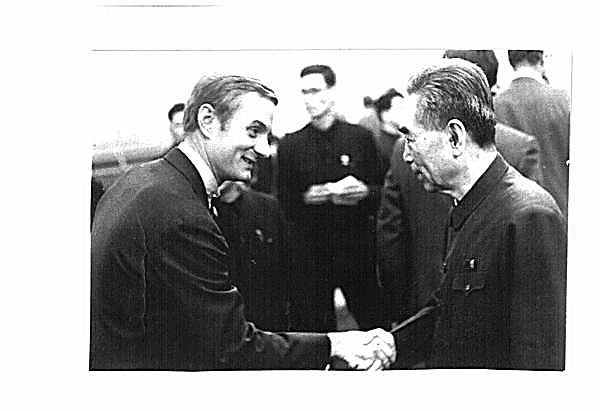

"If Mr Nixon had revealed he was going to the moon, he could not have flabbergasted his world audience more," a reporter for The Washington Post wrote, clearly having in mind what Lord dubbed the "constant propaganda exchanges and mutual isolation" that had characterized the bilateral relationship.
On Feb 17, 1972, Nixon, his wife Pat, other core members of the group including Kissinger, Lord and the secretary of state Rogers, and a half dozen reporters took off from Andrews Air Force Base in Air Force One.
The rest of the entourage, including Platt and the majority of the 87 journalists who had gleefully joined in "this voyage into the history books", were onboard two specially chartered Boeing 707s named "Ni Hao One" and "Ni Hao Two", ni hao being the Chinese equivalent of hello.
Throughout the trip, Lord, who during preparations had put together six black briefing books which, if stacked, "would easily have been more than a foot tall", continually received requests coming back from Nixon for more information.
"I have never seen any president work as hard for a single event or trip as Nixon worked for this trip," Lord said, pointing to the president's handwritten marks and annotations on almost every page of the briefing books.
"Nixon wanted to have a good sense of Chinese culture and history ... how he could work in little Chinese sayings and poetry in his toasts," he reflected, believing that the president was driven both by "a genuine interest in China" and by "his recognition of the mission's tremendous scope and challenge".
No single image spoke more powerfully about a shared willingness to take on that challenge than the handshake between Nixon and Zhou Enlai at Beijing Capital Airport on that morning of Feb 21, 1972, one that was chilly yet drenched in sunshine.
Having landed before Nixon, Platt joined the press in "an area just behind the left wing of President Nixon's aircraft after it rolled to a stop". From a worm's eye vantage point framed by the engines of the Boeing 707, he took his own films of the "historic, and some felt endless, handshake".